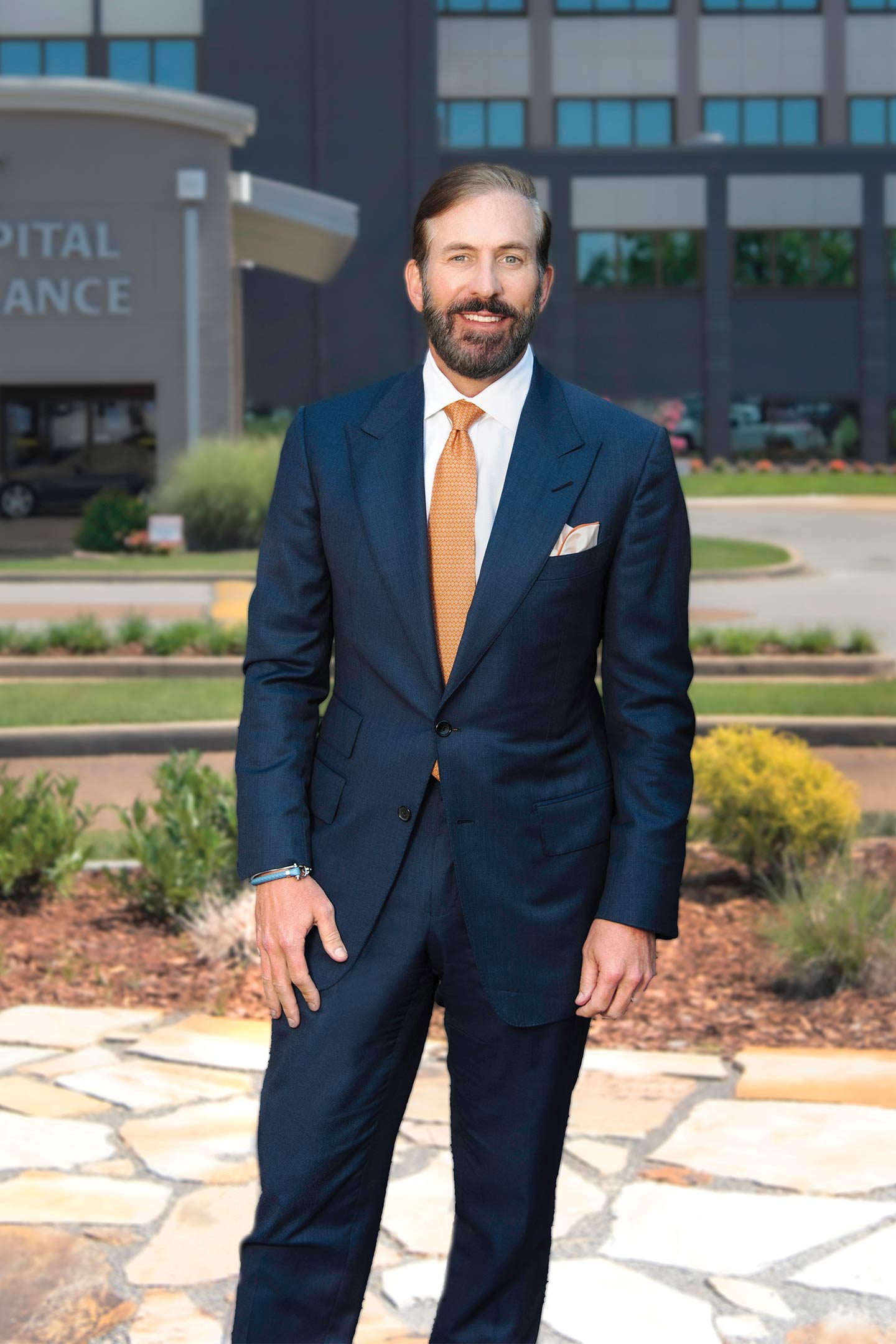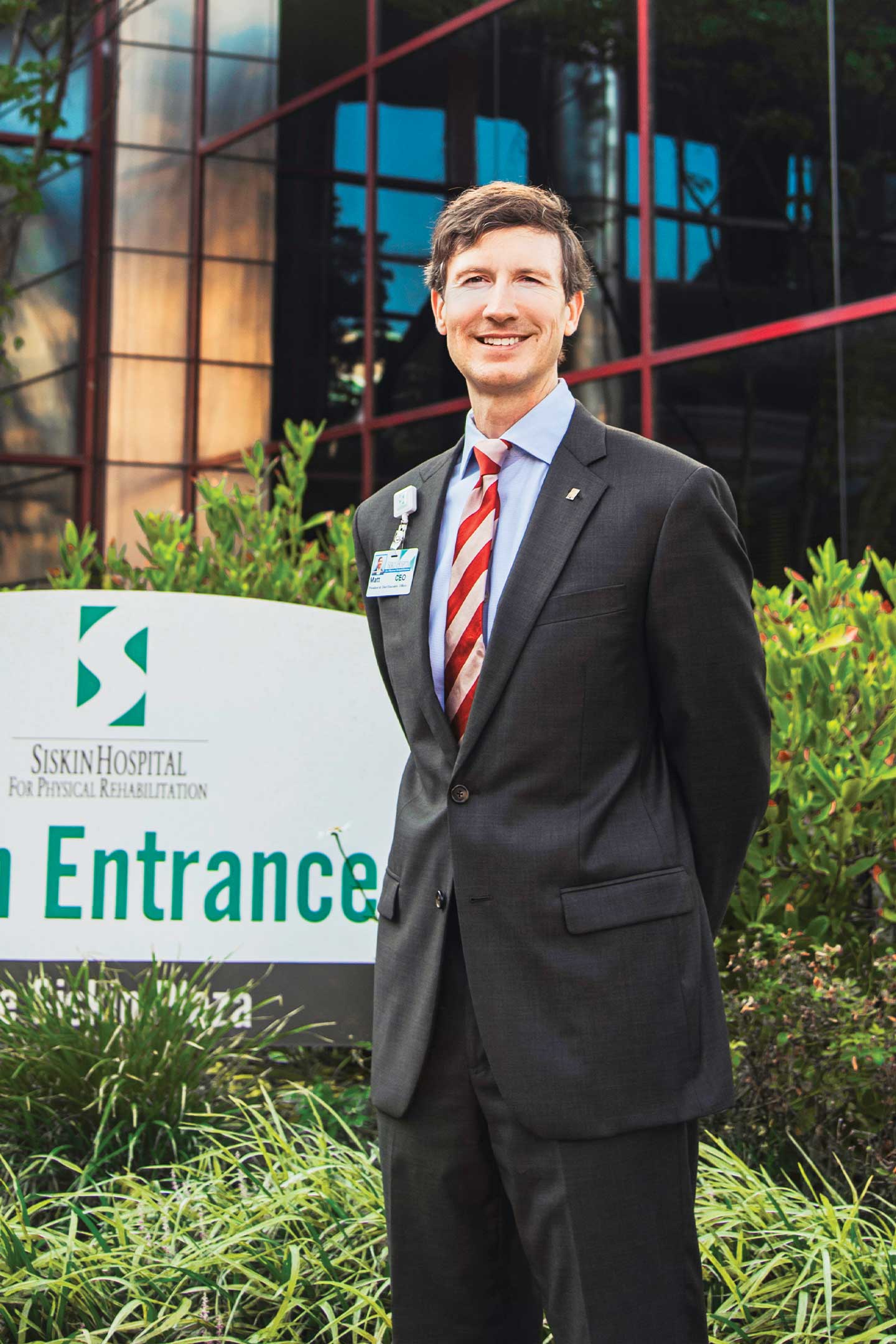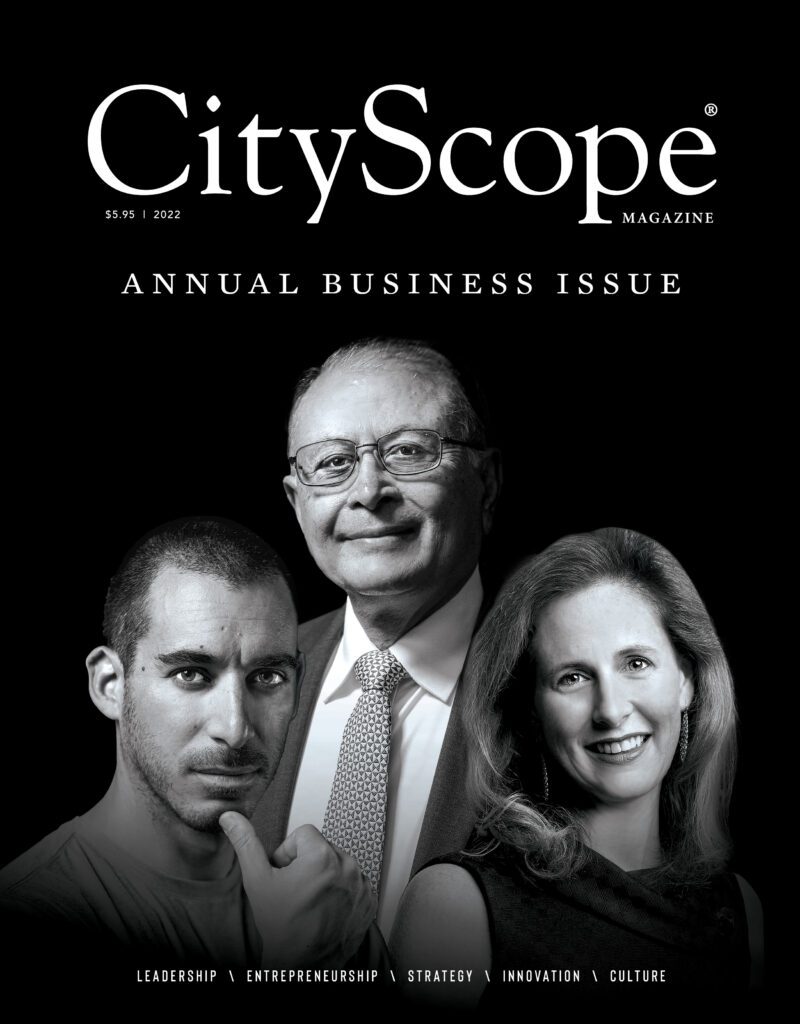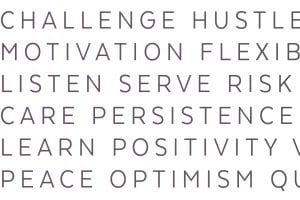Here, we asked area hospital CEOs to share their thoughts on what great leadership entails.
Twenty-twenty has been a year of unprecedented change and unrivaled challenge – and it’s only August. COVID-19 hit with little warning, bringing with it chaos and stress to our health care systems, our economy, and our livelihoods. The consequences have been swift, and they will be lasting. But in the face of fear and uncertainty, those who stand up and lead with a ferocious fervor will have an impact felt by all.
Photography by Emily Long
—
Janelle Reilly (Above)
Market CEO, CHI Memorial
It is often said there are six attributes that great leaders have in common: They know how to inspire trust, they are emotionally intelligent, they articulate a higher vision, they are authentic, they are tough-minded on standards and tender-hearted with people, and they know how to cultivate and nurture a team to achieve results. As leaders, we are integral to the success of our organization but not the sole source. In my career, I’ve followed a servant leadership model – serve first, cultivate a shared vision that inspires, build trust – and when well-executed, makes every team member believe success would not have been achieved without their contribution. In my experience, teams will outperform the individual every time, and in most cases, the team will achieve amazing results beyond expectations. Team accountability must be transparent with balanced scorecards that provide a lens into the work, highlight the wins, and provide a focal point for areas to strengthen. Finally, we must encourage time for self-care – it is not an indulgence but a necessity. Meditate, pray, exercise, laugh, and be reminded that you are important to those who love you. I wholeheartedly believe we must serve the people that we lead. As St. Francis of Assisi said, “Preach the Gospel … and if necessary, use words.”

JT Barnhart, FACHE
CEO, Tennova Healthcare Cleveland
As the leader of our organization, the most important aspect of my role is to act as a resource and strong advocate for our associates. This is developed through a continuous focus on providing the necessary tools enabling our team to achieve our mission of improving the lives of our community. The best way to accomplish this is to remain highly visible and open to all feedback, which works to establish a culture of constructive communication. Good leaders understand that an institution’s most valuable resource is its people. Creating an environment that allows them to focus on their roles without barriers is the ultimate goal.

Tracy Wood
President & CEO, Hospice of Chattanooga, Alleo Health System
The word leader has various meanings. A leader is someone who shapes a culture, whether it’s the nation, the state, the community, or an organization. A leader is someone who knows their team – their strengths and their weaknesses – knows them on a personal level. What differentiates a good leader from a great leader is often not on a resumé or part of an interview – it is their character and ability to show empathy. An integral part of character consists of courage and sacrifice. A leader has courage to take a stand, take risks, and learn from their experiences. A leader possesses the willingness to sacrifice their own time, energy, and emotional needs. A great leader sees and embraces diversity, whether that be race, gender, culture, talent, education, or socioeconomic background and knows that these factors contribute to the quality and well-being of the organization.
I am inspired daily by the leadership skills I see in my own team – the ability to listen and consider what others bring to the table, the ability to empathize and show human emotion, the ability to communicate throughout our various teams and provide a clear understanding of the vision of the organization. They are not only listening, empathizing, and communicating, but also holding each other and myself accountable. What makes a great leader, to me, is who a leader surrounds themselves with. The character of a leader oftentimes shows through their teammates.

Thomas Ozburn
President & CEO, Parkridge Health System
Great leadership is living and breathing your organization’s mission and values. In health care, our mission is patient-centered, and our charge is to heal with dignity and respect. Those values form the basis for how I engage with our patients and my colleagues on a daily basis.
Those in leadership positions know that establishing yourself as a dependable leader starts on day one. That’s why, when I am building a team and beginning a new position – as I did at Parkridge nearly four years ago – I focus on three primary objectives:
- Mission is the most important concept of our organization, and the patient is at the center.
- Our colleagues are critical in making the mission central. People don’t follow titles, they follow inspiration, so it’s important for leaders to be transparent, authentic, and humble.
- You have to establish a culture in which values support your mission and guide your organization. We deliberately chose a historic day – the day of the solar eclipse – for the Parkridge leadership team to gather offsite and develop the core values that would become our I H.E.A.L. (honesty, excellence, accountability, and leadership) philosophy. These were not Tom’s values. They were the values forged by many on a special day in history. Eclipses don’t happen often, neither should the development of your core values.

Scott Rowe, PT
CEO, Encompass Health Rehabilitation Hospital of Chattanooga
Great leadership is developing a vision for an organization that all employees can embrace. This vision should challenge each individual to seek consistent improvement while keeping the customer/patient at the forefront. Ultimately, it’s about serving those you lead and truly appreciating each individual’s contribution to the success of the organization.
Our current pandemic has emphasized the importance of trust in leadership. Trust is cultivated by leaders over time by being accessible, authentic, and transparent. Trust is established through a culmination of following through on commitments, remaining consistent so that all in the organization know what to expect, and truly walking the talk by demonstrating the qualities that are expected of everyone in the organization. Trusting that leaders are making decisions in the best interest of employees and the goals of the organization frees everyone to focus on their individual responsibilities. Conversely, a lack of trust in a leader and by a leader leads to the inefficiencies of second-guessing and micromanaging while stifling growth and innovation.
Being a good leader means knowing when to step up and provide a helping hand and when to step back and let others share their gifts and talents. Good leaders work to serve those they lead, either by rolling up their sleeves and working side-by-side or stepping forward with vision and direction that creates a common goal for all in the organization to rally around. Maintaining this balance of serving and motivating is a key to success for any leader.

Matthew A. Gibson, PhD, FACHE
President & CEO, Siskin Hospital for Physical Rehabilitation
The last six months have been a unique time to be a new CEO in the hospital industry. Although the COVID-19 pandemic has presented exceptional challenges, I am extremely pleased with the leadership displayed by my team. As we continue to navigate the pandemic, keep our patients safe, and meet Siskin Hospital’s mission, words expressed by Theodore Roosevelt 110 years ago resonate: ‘It is not the critic who counts; not the man who points out how the strong man stumbles, or where the doer of deeds could have done them better,’ avowed Roosevelt. ‘The credit belongs to the man who is actually in the arena, whose face is marred by dust and sweat and blood; who strives valiantly; who errs, who comes short again and again, because there is no effort without error and shortcoming; but who does actually strive to do the deeds; who knows great enthusiasms, the great devotions; who spends himself in a worthy cause; who at the best knows in the end the triumph of high achievement, and who at the worst, if he fails, at least fails while daring greatly, so that his place shall never be with those cold and timid souls who neither know victory nor defeat.’
Perfection, nor timorous inaction, is great leadership. Distinguished leadership requires a committed, diverse team striving repeatedly for excellence while recognizing this ongoing pursuit will involve successes and setbacks.

William Jackson, MD, MBA
President & CEO, Erlanger Health System
I believe great leadership arises from three fundamental elements – character, servanthood, and competence.
Character is the foundation. Do I keep my word, even when it hurts? Do I own the blame and share the praise? Do I admit when I’m wrong? Do I work unreservedly and give an exceptional effort regardless of how I feel on a particular day? Do I apologize when I’ve wounded somebody? Do I speak the truth regardless of consequence? Do I conduct business with humility and integrity? As Horace Greeley penned, “Fame is a vapor, popularity an accident, riches take wings, those who cheer today will curse tomorrow; only one thing endures – character.”
Servanthood is also essential. Leaders (and the positions and titles associated with leadership) exist primarily to serve other people. Certain skills, such as vision casting, outlining strategy, being comfortable with ambiguity, and making tough decisions, are necessary for effective leadership. However, the leader’s foremost day-to-day responsibilities are building relationships, breaking down barriers, and solving problems so that the people of an organization can provide meaning and value to themselves and others.
Third, a leader must engender confidence, and this arises from demonstrated competence. Continuous scholarship, modeling of excellence, and uncompromising commitment to high standards are necessary. In our industry, where patients entrust us with their health and well-being, there is an ever-present obligation to deliver outstanding and compassionate care. Fulfilling this responsibility requires expertise and a commitment to lifelong learning.







